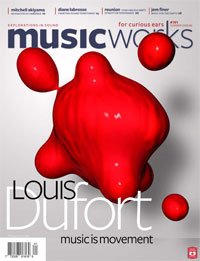I’m moving a topic from a reply I made in the comments up to a new entry, because it strikes me that it may explain some things. I piss people off all the time by making what people think are generalizations, that might more charitably be characterized as descriptions of collective behavior. As someone rather hyper-aware of peer pressure and who reflexively recoils from it, perhaps collective behavior is something I’m more sensitive to than others.Â
Let’s take that mythical animal, “the audience.” “You can’t talk about the audience, there is no such thing as the audience.” Well, these days I live like a hermit, but keep in mind that for many years I attended five concerts a week, often two or three in an evening, at ten or 15 usual spaces all over New York. I became very aware, among other things, of how a performance that drew cheers from one audience might get blank stares from another, and it was to some extent predictable. I saw the audiences more regularly than I did the individual performers, and got to know them better. I ranged the city from Avery Fisher Hall to King Tut’s Wa-wa Hut; if you only get your new-music fixes at, say, Miller Theater and Carnegie Hall, you may never have learned enough about audiences to realize how much, and how predictably, they can vary.
I knew the BAM audience (best, most nuanced audience in America), the NY Philharmonic audience (worst and rudest), the Kitchen audience (hip but not very spontaneous), the Experimental Intermedia audience (all friends, and undemonstrative), the Chicago jazz audience (very savvy and good-humored, intense listeners). I sat in the Chicago Symphony audience among people who’d made up their minds before they came in, half believing that Georg Solti was a god who could do no wrong and the other half convinced the orchestra would never again be what it used to be under Reiner. I sat at Roulette in the middle of an early ’90s John Zorn audience indistinguishable from a Barack Obama rally today – you betrayed divergence from the prevalent riotous approval at your peril. I sat, or stood, in the Knitting Factory and CBGBs (on new music nights) among audiences whose members, aside from myself, ranged in age from 21 to 23. These toddlers made no distinction between one act and another, one piece and another – they weren’t appraising the music, they were learning the scene, mindful to show a hip level of enthusiasm, but afraid to look uncool. I would observe the audience’s reactions as a counterpoint to my own, and these post-pubescent audiences were worthless for that – it was like I was the only subjective consciousness in the room.
I’ve seen audiences lie, in both directions. I’ve seen audiences spend the duration of a performance bored and restless, flipping through their programs, and then burst into a standing ovation when it was over, because the music was something they were “supposed” to approve; and I’ve seen audiences get caught up curiously and very attentive, and then applaud tepidly and speak slightingly of the music during intermission, because the composer’s reputation was still in doubt. On the other hand, I’ve seen a sophisticated audience all start backward at once at a daring turn in the middle of a fantastic ROVA sax quartet improv, and another all suddenly burst into a guffaw when Rzewski slyly quoted Beethoven. We all like to believe in free will and have faith in the integrity of our individual judgments, but you put 300 people in a room together, point them at a stage, and give them a stimulus, and certain kinds of groupthink take over, except perhaps for an intransigent, peer-pressure-hating curmudgeon like myself. Add to that that audiences tend to be fairly self-selecting, based on venue. If the audience generates a groundswell of enthusiasm, nothing can afterward shake the faith that that reaction was directly attributable to the music itself. That’s often how reputations get made, and then you move the same music to a larger, more formal venue where it falls flat, and everyone gets confused. But if the audience is a well-tuned, sensitive instrument, its behavior can draw a revealing map of how the music works.
The late, great Jim Tenney was someone who’d always tell me, “You can’t generalize about the audience, everyone listens differently.” Well, Jim probably rarely went to the local symphony or the Knitting Factory, but to small new-music concerts where he was surrounded by like-minded individuals who were unusually focussed on their own individual judgment, and, expecting to compare notes with their peers afterward, pretty free from collective bleed-through. Within his usual haunts, he was probably right – you couldn’t generalize about his audience. But Virgil Thomson says somewhere, and I don’t want to go look it up so I’ll paraphrase it and ruin it, that what being a critic teaches a composer is a realism about what can get across to an audience and what can’t, and the sad truth that an effect cannot be communicated simply by wishful thinking. When I talk about “the audience” I may have BAM in mind if I’m thinking of a perfect world, or the NY Phil in mind if I’m thinking of them as a bunch of shits who don’t deserve anything better than Kenny G, but I am thinking of an entity that possesses, for me, a palpable presence. Maybe it’s you who can’t generalize about the audience.
Likewise, I’m hyper-sensitive, perhaps, to the kinds of groupthink that run through the composing world, for which we composers bear, in my view, a collective responsibility. For instance, it’s kind of standard to say today, on one side of the line, that in the 1970s composition teachers pushed their students to write 12-tone music or some suitably complex-sounding equivalent. But I don’t think that’s quite what happened. It seems to me that the real pressure came not from faculty, but from peers and the general environment, and that a kind of macho competitiveness based on compositional systems became an inescapable undercurrent. Probably the professors, who in their own minds were trying to be fair and impartial, took a little more encouraging interest in the students whose music reflected their own interests, and that subtle preferential treatment spread throughout the student body as an emotional charge connected to compositional systems, to which some students gravitated and against which others rebelled, but no one was allowed to remain neutral. That would explain both why so many students remember a perception of having been pushed toward systematic thinking, while so many professors feel injured by any such suggestion. And I was at Oberlin; we’d have Midwest Composer Symposia, and I’d learn that the dynamics were a little different at U. of Michigan, and different again at U. of Iowa.
On composition panels, I’m always the one who notices that, out of 73 orchestral scores by young composers, 19 of them start out with a dramatic single tone crescendoing into a burst of percussion, and of course I immediately disqualify those 19 as composers who’ve succumbed to the clichés of their time. (One of Feldman’s talents was for identifying clichés no one else would recognize as such – like the facts that, in the ’70s, the standard orchestra piece had become 20 minutes, and the default tempo quarter-note equals 72.) Contrarily, I notice a 7-against-6 pattern running through a piece by Ben Neill, and then an 8-against-9 in Evan Ziporyn, and a 6-against-7-against-8 in Glenn Branca, and it occurs to me that there’s a movement going on, and I coin an -ism, and man, does that piss everyone off. I am not supposed to call attention to the things I notice – if they conflict with the article of faith that each one of us is absolutely unique like a snowflake, and impervious to outside suggestion or unconscious imitation, or even picking up ideas that are “in the air.” (Hey, have you noticed that all snowflakes have six sides?)
Among all good liberals, generalizations took on a bad odor in the ’70s, as though they were all of the same form as, “all Blacks are great dancers,” or, “Jewish people are good with money.” My mother had a great put-down line for people who drew conclusions from too little evidence; she’d respond, “All Indians walk single file. I saw one once, and he did.” More recently, though, the idea of groupthink has entered our political discourse as an attempt to describe what goes wrong within professional circles. We composers have groupthink too – and how are we supposed to identify groupthink if we are forbidden to generalize, or notice recurring patterns? The prohibition against generalizing can be a political tool for preventing the recognition and exposure of groupthink. No wonder certain people are so violently opposed to it.
Well, forgive me for being me. I just paint what I see as clearly as you’d paint a tree in your front yard, but being a Scorpio, I perceive the substrata more clearly than the surface. I see patterns, I draw connections, and since no one else sees them, or they’re all focused on other things instead, I must be up to something sinister, or perhaps just crazy. If my descriptions find no resonance they will fade away quickly enough, but I can only employ the talents I have.




